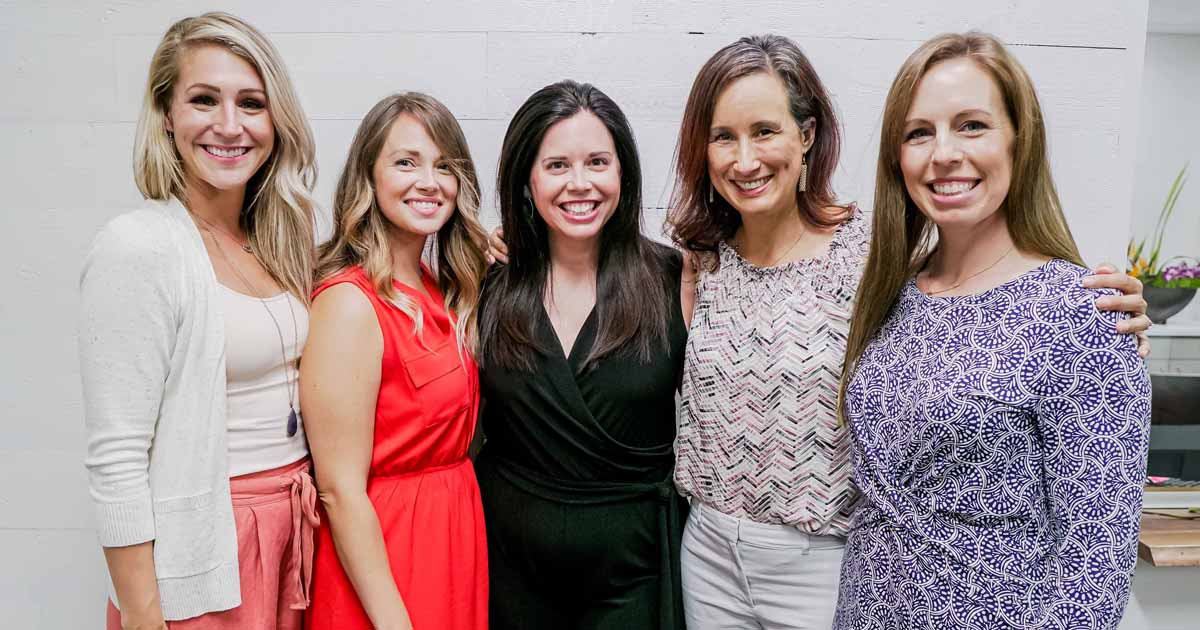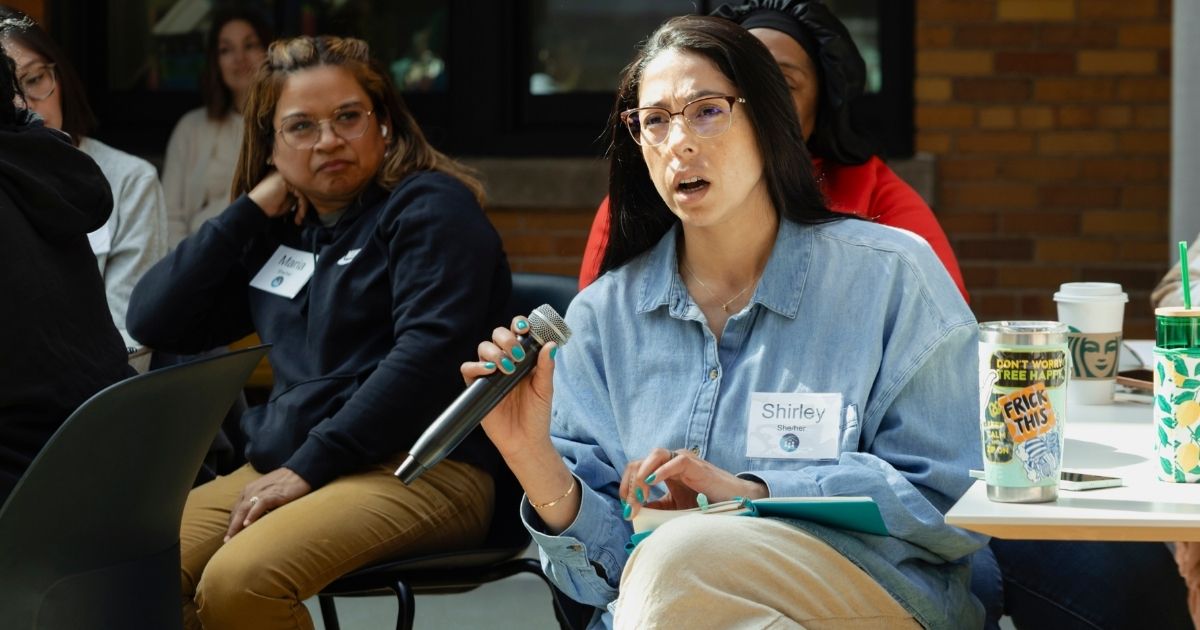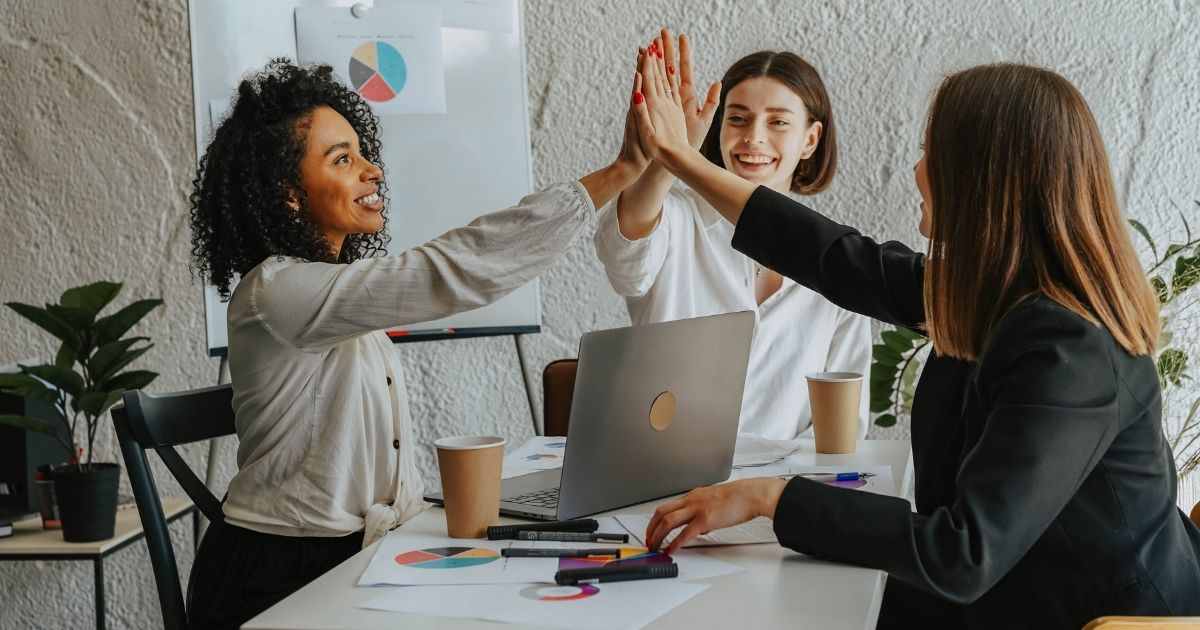None of us will ever forget 2020. Every single one of us is experiencing this type of hardship for the first time and many days we feel alone, fearful, anxious and are wondering if life will ever go back to normal.
Here's what I know about the word normal: It's one of my least favorite. But also, since it seems to be here to stay, let me tell you that what you are all feeling is normal. The survival instinct creates a fear of the unknown. That fear is perpetuated by the perceived or real lack of control that COVID-19 has established for each of us, which in turn has sent us into a tailspin.
Control over what I can control is what helps keep my sanity. I control my schedule with a calendar I share with my husband and kids. I control my expectations by communicating my thoughts with those around me. But control in general feels like it has been stripped from all of us.
Working in medicine, I've seen patients present with a vast array of symptoms they cannot explain—fatigue, changes in weight, gastrointestinal disturbances, changes in appetite, headaches, muscle and joint aches, an increase in irritability or a short fuse, and a general disengagement with the things that may have previously brought them joy. Some of these patients have not been diagnosed in the past with anxiety or depression and wouldn't describe themselves as anxious or depressed, but some of them have. Their symptoms, however, don't often follow the typical panic attack or depressive symptoms. So, what gives?
I decided to see if I could gain some clarity by chatting with two of the most brilliant mental health experts I'm privileged to work with: Erin Walker, a Certified Physician Assistant with specialty training in psychiatry, and Justine Braford, a Licensed Clinical Social Worker and co-owner and founder of Grand Rapids Specialty Therapy.
Medical Care
I was curious as to what both Erin and Justine were seeing in regards to people seeking general medical care. I know some are avoiding medical offices completely due to so many reasons—stress, concern regarding COVID-19, financial strains due to unemployment, distrust of medical and insurance systems, and barriers to access. I wondered what practices they're doing to assure people that it's not only safe but recommended to receive their preventative care.
"Medical offices have worked hard to remain safe during the pandemic. Everything from beefed up cleaning routines to minimizing the number of people in the office at one time. It is safe for you to continue your care," said Walker. "Many offices will also offer payment plans during this time and will work with you financially. Don't sacrifice your health during this temporary time, as it could result in long term consequences."
Let me tell you, I am typically not the person who praises insurance companies, but I am so proud of how well insurance companies have decided to step up and cover telehealth, increasing access to care to countless people across the country. This has been one of the barriers, even prior to COVID-19, that was just unnecessary. There are plenty of health matters, especially mental health matters, that can be addressed just as well, if not better, via telehealth.
Yep, I said better!
It decreases the stress of needing to be in a public place, decreases the time one needs to take off work to have a medical appointment, and provides access to healthcare to those without transportation, childcare or other support to get into an office.
I work in Gynecology and yes, I received all the memes about what a Gynecologic visit might look like via telehealth. No, we cannot do a pap smear via telehealth! So yes, there are some things that do still need to be done in an office setting. But telehealth is here to stay and I believe even the insurance companies realize its importance in overall and preventative health. For those with financial concerns regarding copays, Braford recommends trying a script such as:
"I've had financial insecurity since the pandemic and would like to inquire about a sliding scale, discount options, or even a flexible payment plan."
These are common requests and we would all like to encourage people to advocate for themselves and ask what is available.
Insomnia
One of the more common concerns I am seeing right now. Many come to me thinking it might be their hormones. Sometimes it is, but often there are other contributing factors.
For those who hormonal control is not a viable option, Walker recommends routine and sleep hygiene. I'll be the first to admit the medical community has sometimes ridiculous terminology! (No, this does not mean you're sleeping dirty).
"Our bodies are not doing the same routine in quarantine and that often results in sleep disturbances. Sleep hygiene is key," said Walker. "Avoid caffeine past 2 p.m., continue some form of daily exercise and avoid electronics one hour before bed."
Braford also has some natural tips.
"Our biological rhythms are sensitive and sleep is the foundation of emotional well-being and stress management," said Braford, noting bedtime routines should be well established with little deviation in the routine and timing. "You should go to bed at the same time every evening and wake at the same time every day, even on the weekends.
"Caffeine has an extraordinarily long half-life. Stop drinking it as early in the day as possible. At bedtime, try a progressive muscle relaxation or meditation to wind down completely."
If you're one of my patients, you may have heard me recommend stretching before bed. Turn off the screens, maybe turn on some music, and sit for a few minutes doing gentle stretches—a simple way to wind down and increase healthy blood flow!
Treatment
There are a multitude of therapeutic services available, but both Walker and Braford agree that Cognitive Behavioral Therapy (CBT) is one of the most effective treatments for anxiety and depression.
"CBT focuses on the identification of thought processes and their downstream impact on emotions and actions. Perhaps most healing, however, has been the presence of the therapeutic relationship for patients," said Braford. "A sense of, 'I'm not in this alone, I have people who are here to help me through, and my therapist is one of those people.' Regardless of the specific intervention used, time and again the research confirms that the therapeutic relationship is the strongest predictor of positive outcomes."
Braford also notes that it's clearer than ever that social connectedness plays a huge role in resilience and mental health.
Coping
This is where I find myself most days. We are in an unprecedented time where coping and survival are top of the list. I read and hear about many different coping mechanisms but wondered what the professionals had to say.
"I always encourage my patients to engage in self-care, which can look different from one person to the next," said Walker. "Complementary techniques to deal with stress include yoga, massage, meditation, reiki, and acupuncture, to name a few."
Coming from a psychiatric medical provider who writes prescriptions, I found this an interesting take. The idea that medication is right for some, but for others it may be some eastern medicine techniques, and for others it may be both. There is not a right or wrong answer to what helps you cope. The saying "You do you" seems to come into play right about here! Braford also had some specific advice with this:
"I've encouraged patients to listen to the feedback their body provides. Fatigue? Your body's calling you to rest," said Braford, noting rest is different for everyone. "For some it's a nap, for others it's a long walk with a friend. The identification of a feeling in your body and its connection with an emotional state will assist in formulating a helpful response.
If you are uncertain, Braford suggests trying this:
- Get very quiet with your body and take a few long, deep, breaths.
- Starting at the top of your head and scanning down toward your feet, notice the sensations your body has.
- Ask your body "what do you need?" Perhaps you get a word like "rest," "peace," "fuel," or "connection."
- Ask yourself: "What is one small thing I can do to meet this need?"
Kids
If there's anything that can create anxiety as a parent, it's the physical and mental wellbeing of their children. I find it difficult as a parent myself not to project my anxiety onto my children.
"Children look to their parents for safety and guidance," said Braford. "I've tried to follow the advice, 'When things aren't normal, do normal things.' As much as possible, try to stick to routine; make each day predictable, with a bit of room for spontaneity."
Braford adds that children often ask for love in unloving ways.
"Even tantrums are a bid for connection, though adults are often left swept up in the calamity and disoriented themselves at times," Braford continued. "Children's brains are far less developed so we can't expect them to cope as well as an adult. If your child is distressed, the first thing to do is soothe them. This may seem obvious but many parents jump to reasoning with a child when they are not in a state to receive these messages. Soothe first, talk later when they are calm and their 'left brain' is ready."
For older children, Braford explains, remember that they have fewer life experiences from which to pull, therefore they are less likely to internalize the idea of emotions, experiences, difficulties etc. as being temporary and/or transient.
"Help them to build resilience by validating them and helping them to identify coping skills for difficult times," she said.
I just have to repeat something here. "Help them to build resilience ..."
This struck me. Could this be an opportunity to help them learn something they would not have had to learn previously? As much as we want to provide everything for our children and keep them from harm, we also want to know they have resilience and integrity when life seems to turn into a bit of a dumpster fire. We didn't choose this pandemic, but we can choose resiliency.
Community
We are realizing more than ever the importance of our village in our overall health and wellbeing. One thing I've learned is that as much as I love hugs, they may not be currently necessary to achieve the sense of support and community that helps me thrive. I'd like to leave you with a thought from Braford:
"We were never meant to be so distanced from others. Our survival as a species has depended on us working together and being in community with one another and now, more than ever, we are called to do so," Braford said. "Our energy is best spent on working together toward creative solutions around common goals and helping the most severely affected and disenfranchised among us.
"These times are absolutely temporary. It is also an opportunity to build something better than we had and the application of that thought is infinite."
Written by Nisha McKenzie, PA-C, CSC, NCMP, IF, Women's Health Collective.
Courtesy of Women's Health Collective.




